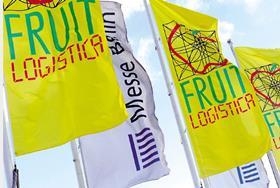
Fruit Logistica 2011, which takes place from the 9-11 February in Berlin, is the leading marketing platform for central and eastern European countries interested in presenting their products and services, strengthening business relationships and establishing new contacts.
This region has maintained a strong presence at the leading international trade fair for fruit and vegetable marketing over the past few years. More than 100 exhibitors from central and eastern Europe, including EU countries Poland, Slovakia, Slovenia and Hungary as well as non-EU countries Croatia, Russia, Serbia and Ukraine, will present their products and services next year to international experts. The event is expected to attract more than 50,000 trade visitors from 120 countries, including several thousand industry representatives from most central and eastern European countries.
Fruit Logistica is a key event for fresh produce companies in central and eastern Europe because, among the many benefits, it offers excellent contact opportunities to the global fruit and vegetable trade. A growing number of potential customers from Western Europe and overseas come to the trade fair to make contact with exhibitors from central and eastern Europe and explore the opportunities for business deals and joint ventures.
Fruit Logistica offers Central and Eastern European fruit and vegetable producers an ideal platform for promoting products that are not well known in (western) Europe and establishing contact with trade partners. The primary objective for exhibitors is to strengthen existing business relationships and find new partners.
The many different interests pursued by the region's organisations and enterprises at Fruit Logistica and how the different countries are presented as produce industry partners are illustrated by the following examples from Fruit Logistica 2010:
Systematic development of the Russian market
In spring of 2000, the six leading growers' organisations for marketing apples in Germany, which represent nearly 80 per cent of the entire marketing volume from organised production, founded the German Fruit Export Office (DOEK). The aim is to systematically develop the Russian market and provide local support. A cooperative agreement was concluded with Rus Marketing GmbH, which maintains a representative office in Moscow. Along with fruit and vegetables, future plans focus on supplying flowers and plants. At Fruit Logistica 2010, DOEK GmbH successfully presented its products and services at the BVEO joint stand.
Hungary advertises lesser-known products ?
'Hungarian fruit and vegetable production is currently undergoing rapid development', explained Dr Béla Mártonffy, managing director of FruitVeB at last year's Fruit Logistica. He said that the aim was not to promote Hungarian goods as a mass product in Europe, but to emphasise the special quality. 'Along with better known Hungarian goods, like chillies, watermelons, mushrooms, apricots, sour cherries and walnuts, we want to expand our export product range'. He mentioned examples, including sweet cherries, sour cherries, sugar melons, asparagus, sweet maize and tomatoes. 'Fruit Logistica offers Hungarian fruit and vegetable producers an ideal platform for promoting lesser known goods in other parts of Europe and finding retail partners for these products'.
This is the 13th time that the Agrármarketing Centrum has supported and organised a trade fair presence for '…the most outstanding Hungarian fruit and vegetable export companies', says project manager Róbert Ivánfalvi. He pointed out that 16 of the producers represented at Fruit Logistica covered a total of around 35 Hungarian agri-businesses.
Products included apricots, sweet-tasting sour cherries, lettuce, sweet peppers, watermelons and mushrooms. For example, DATéSZ Zrt. has twelve production sites in the south of Hungary and 2,000 growers in a total area of over 20,000 hectares. The company sells 70,000 to 100,000 tonnes of fruit and vegetables each year. This includes over 25 different fruit varieties sold in 80 to 100 different product forms, and 60 different vegetable varieties in 120 different forms.
Macedonia and Ukraine with SIPPO?
SIPPO is a Swiss import promotion programme for small and medium-sized enterprises based in emerging countries. The programme helps the companies prepare their market entry and supports them for three years in Europe. Two of these countries were represented at the SIPPO stand at Fruit Logistica 2010: Macedonia with eight companies and Ukraine with four.
'All of these countries have tremendous potential for agriculture', explained Project Director Constantin Kostyal. 'They have good water, soil, climate and a very sound knowledge of agriculture'.
The products ranged from peppers, cherry tomatoes and lettuce from Macedonia, to honeydew melons, seedless watermelons and sweet cherries from Ukraine. 'The main objective for us and the exhibitors is to strengthen our existing trade relationships and to find new partners', added Kostyal.
Lithuania: Wild berries and mushrooms of exceptional quality??
The Lithaunian company Fudo had an extremely successful start at Fruit Logistica 2010. Fudo markets wild mushrooms, including chanterelles and porcini, as well as wild berries ranging from lingonberries and blackberries, to blueberries and cranberries all in consistently high quality.
'We are very satisfied with our presence at the trade fair. FRUIT LOGISTICA is a dynamic event where we establish more new contacts than at any other exhibition. This is where we conduct in-depth, highly productive sales talks', said Fudo Sales Manager Ausra Armoniene. Along with wild berries and mushrooms, Fudo sells wooden containers in a variety of sizes.
Poland with a group stand from Masovia?
The Polish region of Masovia is represented at Fruit Logistica for the first time, with 15 fruit and vegetable growers at a joint stand. 'We are very pleased with the response we have had at Fruit Logistica', said Rafael Rzepkowski. 'We want to use the trade fair to attract attention as a producer country'. Key business partners were largely German clients, he said. However, they are now focusing their attention on markets in Russia.



